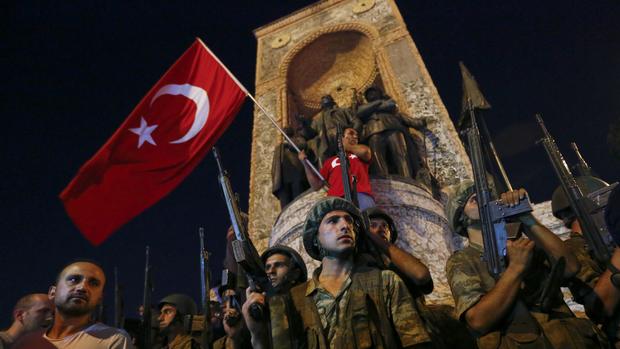Turkish president decrees sweeping military reforms
ISTANBUL - President Recep Tayyip Erdogan issued a new presidential decree Sunday that introduced sweeping reforms to Turkey's military in the wake of a July 15 failed coup, bringing the Turkish armed forces further under civilian authority.
The decree, the third to have been issued after a three-month state of emergency was declared following the attempted coup, gives the president and prime minister the authority to issue direct orders to the commanders of the army, air force and navy.
It also announces the discharge of 1,389 military personnel, including Erdogan's chief military adviser who had been arrested days after the attempted putsch, the Chief of General Staff's charge d'affaires and the defense minister's chief secretary.
It puts the force commands directly under the defense ministry, puts all military hospitals under the authority of the health ministry instead of the military, and also expands the Supreme Military Council - the body which makes decisions on military affairs and appointments - to include the deputy prime ministers and the justice, foreign and interior ministers.
The document, published in the official gazette Sunday, also shuts down all military schools, academies and non-commissioned officer training institutes and establishes a new national defense university to train officers.
In the wake of the attempted coup, which killed more than 200 people, Erdogan launched a sweeping crackdown on those believed linked to the movement of U.S.-based cleric Fethullah Gulen, whom he accuses of instigating the coup. Gulen, who lives in self-imposed exile in Pennsylvania, denies any knowledge of the coup.
A Turkish-language draft document obtained by CBS News shows one motivation that may have driven the failed coup plotters, according to a senior Turkish government official.
The source tells CBS News the document shows a prosecutor intended to launch a court case against Erdogan and other top officials on charges of colluding with terrorists, citing as evidence their six-year attempt to negotiate a peace settlement with PKK Kurdish rebels.
Gulen's supporters serve in large numbers in the police, judiciary, and business community in Turkey, and have used lawsuits and court cases in the past against their foes, including their former allies in the AKP (Erdogan's party). The Gulenists have been at odds with the PKK for influence in the southeast of the country. Gulenists attempted to indict the head of Turkey's intelligence agency into court in 2012 on terrorism charges because of his role in negotiating with the PKK. Gulen's supporters are staunchly against Kurdish autonomy.
The source tells CBS News the draft indictment was found in the office of prosecutor Mehmet Sel, one of thousands of government officials dismissed from their posts in recent weeks. He was arrested on charges of participating in the coup.
More than 10,000 have been arrested in the crackdown, most of whom are military personnel. Thousands more have been detained while nearly 70,000 people have been suspended or dismissed from their jobs in the education, media, health care, military and judiciary sectors.
In an interview with private A Haber television Saturday, Erdogan said he also wanted to put the country's intelligence agency MIT and the chief of general staff's headquarters under the presidency.
"If we can pass this small constitution package with (the opposition parties), then the chief of general staff and MIT will be tied to the president," Erdogan told A Haber.
The package would need to be brought to parliament for a vote.
